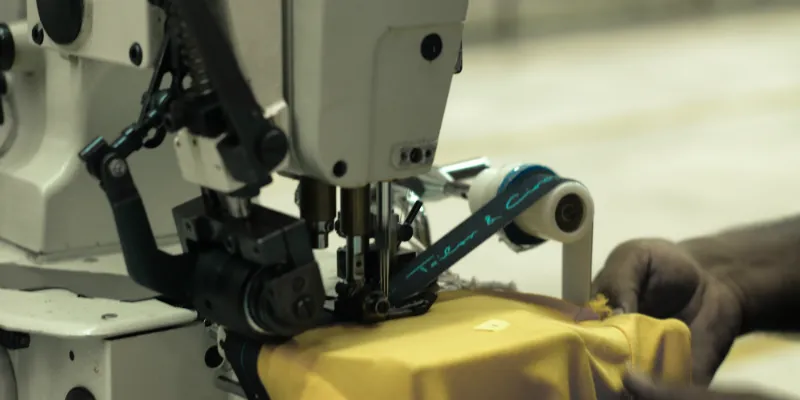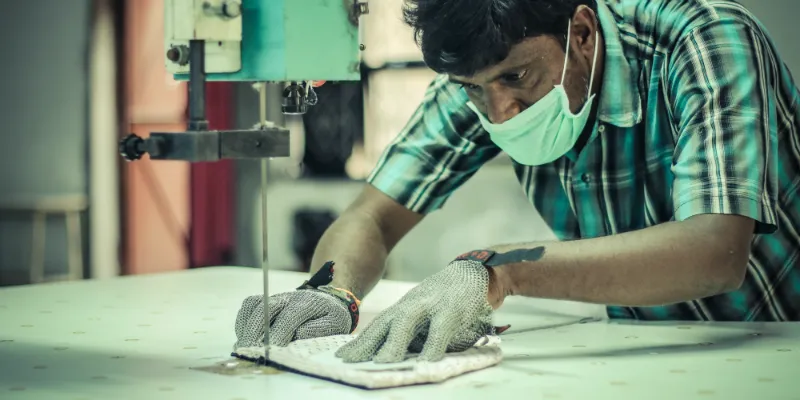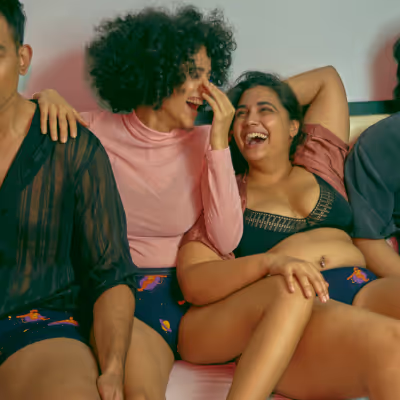This Tirupur-manufactured innerwear brand is targeting astronauts and other niche groups
Seeking to become fully inclusive, Tailor and Circus is aiming for period underwear, wheelchair comfort underwear, disposable underwear, and more.
One may think that a clean-tech engineer, an assistant director, and a clothing factory owner don’t have much in common.
But Gaurav Durasamy, Abishek Elango, and Vasanth Sampath found common ground in their goal to make anti-microbial, self-cleaning underwear for astronauts.
And they want to reach astronauts through their brand Tailor and Circus, which was launched in 2018. But astronauts are just one of the many niche categories Tailor and Circus is aiming for.
Gaurav Durasamy, Co-founder, Tailor and Circus, says:
“We want to build specialisations and address multiple niche groups within the underwear category. For example, we are aiming for period underwear, wheelchair comfort underwear, trans-inclusive underwear, disposable underwear, etc.”
Going by Tailor and Circus’ expertise in making unisex, body-positive, and comfortable underwear, this long-term dream could become reality sooner than expected.

Tailor and Circus founders Gaurav Durasamy (left), Vasanth Sampath (centre) and Abishek Elango (right)
“We created Tailor and Circus after seeing significant gaps in mens’ and womens’ underwear when it came to a compromise between comfort and performance,” Gaurav says. “We have raised an undisclosed amount of funding from friends and family. Besides this funding, we are bootstrapped.”
On one hand, the founders felt that the overt and hyper-sexualisation of traditional underwear had led to a significant drop in interest for women. On the other, they felt that gender bias and hyper-masculinity had led to a shortage of interesting options for men.
Using lenzing micromodal fabric
After research and making a few prototypes, Gaurav says the trio decided to import and use lenzing micromodal fabric from Austria. They felt this unique fabric could address the market gap they had found in the innerwear industry.
Gaurav explains, “These fibres are a natural eco-fibre made from beechwood pulp. They are extracted from beechwood trees in a fully-sustainable cultivation set up.”
Pulp production at the lenzing plant in Austria is self-sufficient and “exceptionally ecological,” Gaurav remarks. The fabric obtained from these fibres is organic and cellulosic, which means it holds a distinct advantage over cotton.

Tailor and Circus fabrics are spun at lenzing-certified mills in South India
“It is more sustainable than cotton as it uses less water and zero pesticides for its cultivation. When used as a fabric, micromodal is three times softer than cotton and more breathable,” Gaurav says. “This keeps your body cooler in temperate climates, making it the ultimate choice of fabric for underwear.”
The current fabric industry features cotton predominantly -- a crop which uses a lot of pesticides and consumes a lot of water. For Gaurav, micromodal fabric is the better choice due to the brand’s sustainable fibre production set up.
“We plan all our fabric imports in advance, and these are only spun at lenzing-certified mills before being moved to our factory for the remaining processes,” he says.
And during a testing round, the founders’ idea was proved to be successful. “Our first invite-only beta round of products sold out within 24 hours. Consequently, the sale of the first 10,000 units was a huge validation for us in terms of proving our product,” Gaurav says.

Tailor and Circus' manufacturing unit is in Tirupur, Tamil Nadu.
Looking at the sales, it’s clear that a niche fabric appeals to more than just niche consumers. The brand has been selling to a range of regular customers through its website and common ecommerce platforms. According to Gaurav, the brand is on track to manufacture and sell four lakh products by 2020.
These products are made in the Tailor and Circus factory in Tirupur, Tamil Nadu. The brand has a team of tailors which is focussed on slow stitching at this factory. Tailor and Circus also has a marketing office in Bengaluru, which comprises a seven-member team, in addition to the founders.
A body-positive approach
Besides sustainable manufacturing, Tailor and Circus is a proponent of body positivity. It uses a range of people as models without being biased about their weight or other physical features. Gaurav says, “We don't airbrush or hide scars, stretch marks, cellulite or shapes in any way.”
“Our Instagram community responded really well to this and fully endorsed our ideology. This helped us build a product range for real sizes. This means a commitment to full inclusivity and zero bias,” he adds.

A Tailor and Circus ad for a unisex, size-inclusive product
Besides comfort and body positivity, Tailor and Circus also passes on a cost advantage to its customers. It sells directly to consumers, which often eliminates the need for middlemen. Gaurav explains how this cuts costs for the customers:
“The markups or extra cost in the underwear industry are seven times the original cost for mass brands and up to twelve times for luxury brands,” he explains, adding, “Our markups are just three times the cost, which is possible only because we sell direct-to-consumer and offer premium products at affordable prices.”
Tailor and Circus products range from Rs 399 to Rs 649 across mens’ and womens’ underwear.
Getting the right fit
After sales, Tailor and Circus tracks data such as customer purchase behaviour, preferences in styles, sizing, designs and more, he says, adding:
“This helps us anticipate customer needs as well as plan our inventory with a constantly growing repeat customer rate. We also take feedback at every stage and plan our next collection and product categories around that.”
But maintaining inventory is easier said than done. The brand consistently sells out faster than it anticipates. This leads to gap days where it runs out of certain sizes or a whole category, Gaurav says.
Further, Tailor and Circus’ social media-focussed marketing model makes it challenging to reach customers who are not on social media platforms.

A Tailor and Circus ad for a blue, unisex underwear piece
Gaurav adds, “We also had initial reluctance from new customers since it is underwear. But we started a ‘satisfaction guarantee system’ where we send you a new size, free of cost, in case there is a size or fitting issue with your first pair.”
With this model in place, he says the brand has seen high customer satisfaction. “We often have customers who end up buying additional products for their partners, children, parents, and in some cases, even their grandparents,” he says.
“They love that they no longer have to shell out Rs 2,000 rupees for a less-comfortable underwear piece from an international brand, or be forced to buy underwear only while on holiday,” he adds, “Our size inclusivity has opened up a whole new set of customers who were neglected by the straight size-loving, model-defined innerwear industry. Overall, the response to both the products and our ideology has been excellent.”
ALSO READ:
How Surat-based XYXX achieved Rs 12 Cr 'brief' success making stylish innerwear for men
Dollar Industries aims to fit as the big boss of innerwear hosiery sector







